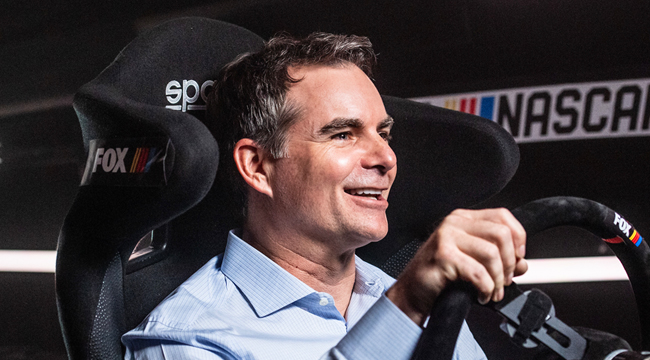
FONTANA, Calif. – Sipping on a glass of red wine, Jeff Gordon can’t turn his reflexes off. There’s an Xfinity Series race on, and his eyes are naturally drawn to the action on screen inside his RV at the infield of the Auto Club Speedway the day before the 400 in mid-March. He’s watching lines and approach and still calculating as if he were still behind the wheel.
Gordon’s always been a bit unsettled; he possesses the Captain America Super Soldier Serum version of whatever ADD is, which has allowed him to host SNL, start a clothing line, run a car dealership, open a children’s hospital just outside Charlotte, build a real estate company, design a racetrack, and yes, produce his own wine. After a Hall of Fame run (he was inducted this year) that saw 93 wins, four Cup titles, and an unforgettable rivalry with Dale Earnhardt Sr., Gordon moved into the broadcast booth with Fox Sports. Even that wasn’t enough, as he’s taken on a bigger role with Hendrick Motorsports, leading to speculation he may someday run the team after Rick Hendrick steps away.
Racers like to stay in motion, and the 47 year old seems as springy as ever. Inertia allows him to thrive, and if juggling all that looks chaotic under the surface, there’s a sense of calm to the man who was one of the most recognizable NASCAR drivers of all-time and represented the heyday of a sport now searching for its new identity.
UPROXX Sports had the chance to sit down with Gordon about his role in racing both past and present, the state of motorsports in 2019, the idea that drivers can also be “more than an athlete” in the same way LeBron James has championed, and more.
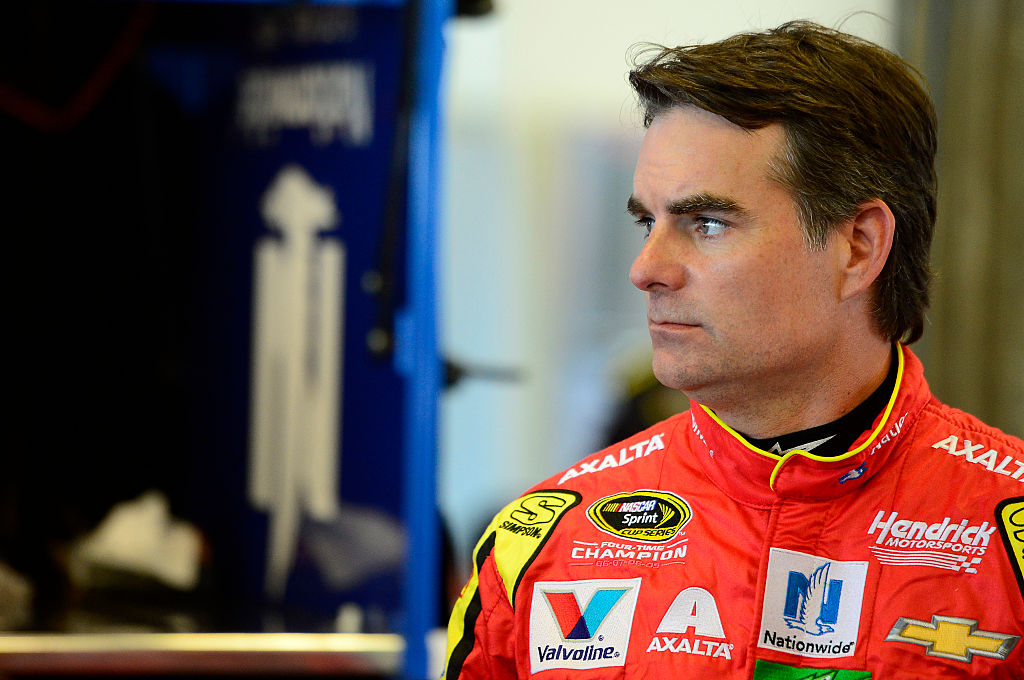
You’re in kind of a unique position having kind of one foot in both worlds now. How do you use the learnings from one to kind of inform the other?
I do. Yeah, I mean it’s definitely a unique perspective and I think each of them lends itself to helping me in the other. Because I feel like from the TV broadcasting side, I see how important the entertainment and the personalities and just what effort goes into putting the broadcast out there and how important it is to the sponsors and to the team. So I learn that and it helps me when I’m on the team side and we’re talking to sponsors or we’re talking to the teams about … they’re so focused on performance, right, and in the competition, which is what they should be.
But at the end of the day, it’s a sport that is based on entertainment, so you’ve got to remember that, and so I think it helps me balance those things out. And I probably didn’t do a good … I wish I would have known more about the broadcasting side of it when I was driving. Because I think it would have helped me focus a little bit more on how I could add to the entertainment value other than just things I’m doing for my sponsors or things that I’m doing on the racetrack.
I always looked at opportunities like doing the Tonight Show or doing Saturday Night Live and those types of things. But I was usually focused on how it was going to help my branding, I wasn’t necessarily focused on what does it do for the sport. Luckily it worked out for both.
We’re in a situation where the sport had to kind of reinvent itself, but out of this friction and struggle comes these opportunities, and it seems like the corner’s been turned on that with your perspective of knowing what that mark was. Nothing’s the same as it was in 1997.
Well, we didn’t have social media. So I think there’s tremendous opportunities in many ways when you look at the media outlets that exist today. But at the same time, it gives people so much more access to different information or ways they can follow the sport or follow so many other things. So it’s hard to just pick a narrow patch and I felt like if you look at the mid-to-late 90s, the reason why the sport thrives so well is because people could say, “Oh yeah, I’m going to tune into NASCAR and I’m going to do it through this channel.”
Yeah. It’s very easy to digest it then, but the flip side is the access you got was all the access that you got.
I actually like something that we’re doing this year where, at least on the west coast and we’ve seen it now twice, where our first practice on Friday’s not aired. And we just come on with qualifying and it’s sort of the less is more mentality, and I actually wouldn’t mind us taking it even a next step further where we’re only showing one practice session on Saturday. I just think that it would show just enough, be just enough of tune in, but leave enough hanging out there that people are more interested to tune in to see what’s going to happen on Sunday.
With the streaming era, everybody started releasing 20-song albums because they thought, “Oh well you’re streaming, it’ll get us more listens, it’ll get us more plays.” There’s more choice, there’s more opportunity to do that. And there’s been a realization recently that it hasn’t quite worked. Doing more doesn’t necessarily mean you get more out of it. There’s something to be said about curating still in this age where you give people something that’s distilled down. You’re not just gonna put wine out that hasn’t sat and actually had a chance to be what you want it to be. You put out the best stuff.
Right, that’s a perfect analogy.
Another thing that I’ve noticed that the sport is doing is getting guys in the booth earlier while they’re still driving. Is that something you would have wanted to do earlier in your career?
It’s funny because when I hired an entertainment lawyer when I was first starting to think about it, the first thing they said was, “Don’t go into the booth.” And I’m like, “Why not? I want to get the experience.” They’re like, “Yeah, but that could be an audition, right? And that audition could go really well or it could go really bad. And right now your stock is pretty good.”
Yeah, leave something to the imagination.
But I do like, doing this broadcast, we’ve seen Kevin Harvick doing a lot of them, I do think it’s good experience. I think it makes you more entertaining. Actually, I find it more entertaining to watch Xfinity races now because I’ve got a guy in the booth who just came out of a car from the Cup Series in practice, and he’s seeing things that maybe I’m not seeing now because I’m not in the car. And so I bet you the last three broadcasts on Saturday that I’ve watched, I’ve taken something that one of those guys has said into the broadcast on Sunday.
So I like it and I’m sure the fans at home enjoy it too. They get great insight and I do think that it opens up the door. If they do well it opens up doors for them post driving, or who knows what could happen, they could have an injury or something like that and it could be something that is an opportunity for them in the future.
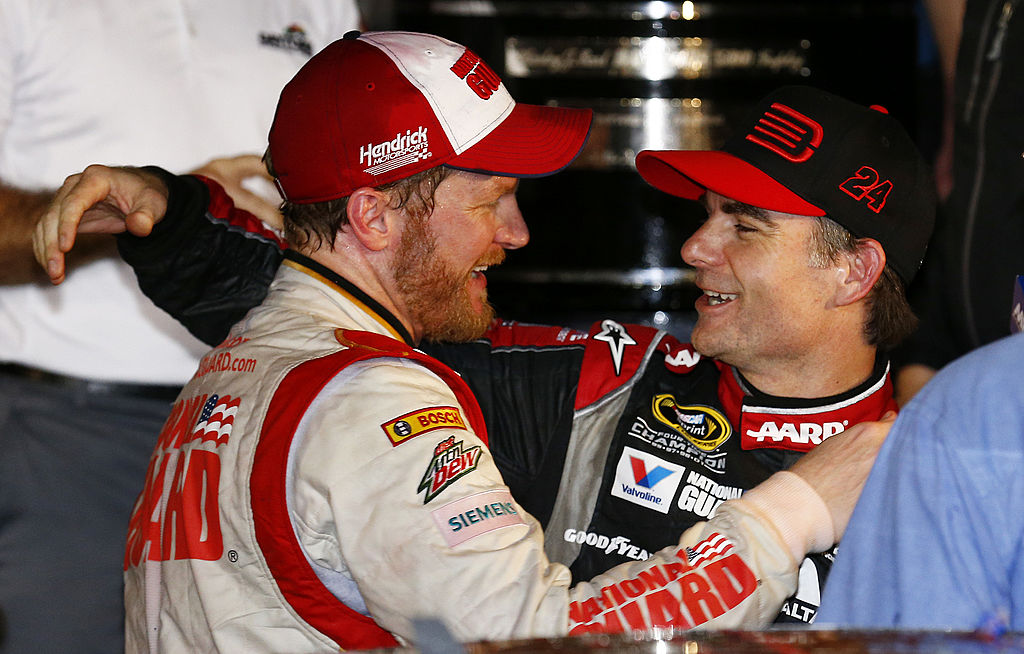
Have guys come to you and have you embraced that role of mentorship? Of sharing that knowledge, especially when you have that opportunity to get your hands on in general with the team? What role do you see yourself in now and then moving forward?
Obviously I have a close relationship with the Hendrick drivers, I’ve probably had more of those conversations with them. But there’s been, I bet, three or four drivers from other teams that have come to me and asked advice about contracts, teams, things like that. About their positioning of … it usually comes down to decision making for them. Now I don’t know, is it their way of saying, “Hey is there an opening at Hendrick Motorsports?” Or is it more of my experience and they feel like I’m going to be honest with them? I would say that has always been my thing, is if you come to me, if you have the guts to come to me and ask my opinion about something, and it could be racing related, on the track or off the track, I’m gonna be really honest with you. And I’m gonna give you a fair, as unbiased opinion as I can.
What have you learned about yourself in the four years now of broadcasting? Some guys, they do the one or two years and they’re out, but you seem to be really enjoying this.
The number one thing I’ve learned is just how big of a race fan I really am, which is what I love. There’s not a practice session, a qualifying session, or a race that I’m not looking forward to doing because there’s always something fascinating that comes along that you don’t necessarily anticipate. And I just love racing. I love all forms of racing, from NASCAR, Formula 1, motocross. I’m gonna go over to the off-road truck series and watch them race tonight.
So I would say that, the job itself feels like a pretty natural fit for me. I’ve never shied away from having conversations and being on camera or doing TV, and so I think all that experience I’ve had over the years has kind of, it’s like it was all leading up to this moment. So I’m enjoying it far more than I anticipated honestly. I thought, well first I was really nervous to do the first few races in the first year, and now I’m much more comfortable and relaxed. And I think it’s showing and it allows me to dive deeper into some good conversations when the time calls for it.
What’s a typical preparation for you from week to week?
It’s funny, it’s not that different from driving. You have a debrief session with the whole team on Tuesday where you talk about the previous race and you do some work about the upcoming race. There’s a group of guys that we have, we call ’em stat guys, and they give us tons of information to dive into and go through. John and I, over the offseason, we work at story lines, stats, I take notes throughout the year even when I’m not doing the races. I’m taking notes about things that I think maybe we can incorporate or things I can talk about. So yeah it’s a good amount of prep work. Obviously there’s nothing physical fitness side of it like when I was driving. And then once you get to the track it’s more of just seeing what comes at you and what’s taking place.
Reacting.
Yeah exactly. Minus the risk.
There’s still some, golf carts can come. They’re coming at you.
True.
You had success by pretty much any measure of what success could be, but what do you think is something that you’re most proud of that you did in the sport?
That Ironman [ed. note: Gordon’s 797 consecutive race streak] was never anything I set out for, and I was never really recognized or even thought of myself as this guy that was tough. But now that I look back on it, it took a lot to keep me from being in that race car. And I think what most of that is, is the desire to not let down my team and the people that work so hard.
So I think I recognized the effort they were putting in and I wanted to make sure that they saw the effort that I was putting in. And there were times that that didn’t always probably balance out, but I think for the most part, most people I worked with would tell you that not only did I bring a skill set or experience that started at a young age, but also a work ethic. And I think the people I was around like my parents early on, and Ray Evernham, and great great teams that taught me that’s what you gotta do.
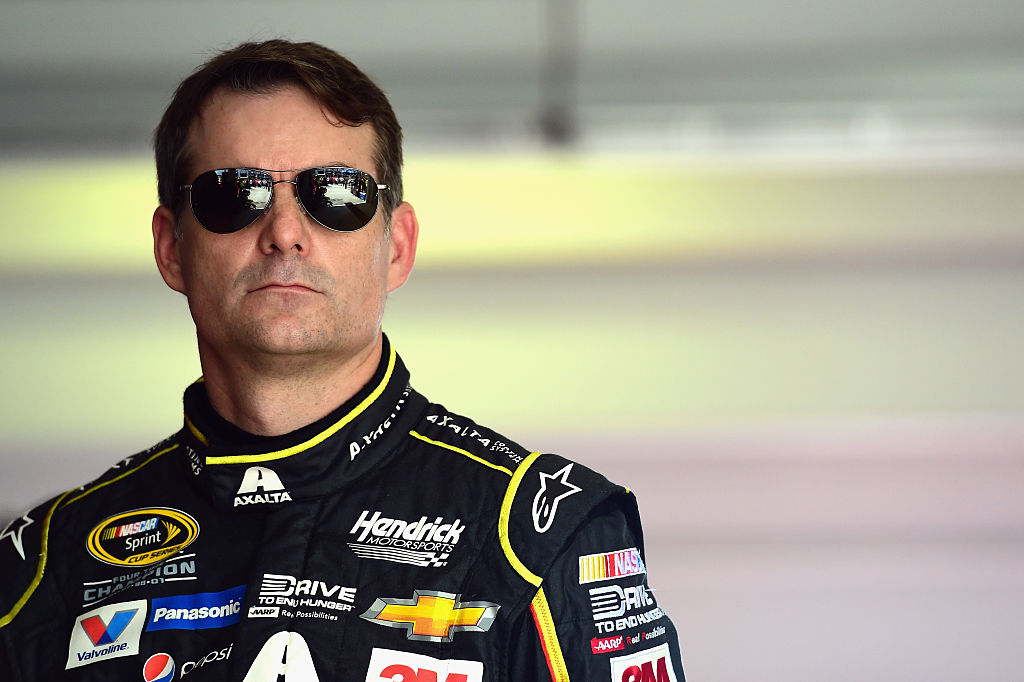
Is there any type of race that you wish you had gotten a chance to do more of?
Well, I love sprint car racing, dirt track racing. I kinda wish I would’ve done a little bit more of it, like with Outlaws, but that time sorta moved on. I would’ve loved to have raced the Indianapolis 500. That was sort of my first passionate dream, my heroes growing up. A.J. Foyt, Johnny Rutherford, Rick Mears. When I drove that F1 car, man, I definitely had the bug to want to drive in a race, but at the same time, the physical fitness level that I was gonna have to get myself into was such an uphill climb that I just don’t know if I was gonna be able to pull that off.
You mentioned the team and wanting to really make sure that you’re living up to those expectations and doing those things. Does that come from family and how you were raised? Is that really what you probably key that in on?
Probably. I think, the one thing when I look at motivation, what motivated me over time, I’m not this self-motivating type of person. That’s not my strong suit. But when you put me into an environment where I’ve got to perform, it just naturally kicks in. So I had to work harder at it away from the track. And that was what I would say my dad, my stepdad, what he really taught me, because I saw him work hard. I saw him work hard at his job in his life, and I wasn’t ever like him, but I recognized that if you wanna be successful, that’s how you do it. Not only did I get the great opportunity to drive for one of the best car owners out there, but that my entire career in Cup was with one, primarily one sponsor, just a few sponsors, so that was something then.
Again, during the time I didn’t look at it, but now I look back on this, especially now. Because one of the things when I’m doing TV is I’m looking at all these stats.
Yeah, you always get these top-10 lists.
I’m looking at starts and top-5, top-10s, and number of teams or crew chiefs somebody’s had or sponsored, all those things. And then I go, “Wow, okay now it puts it more in perspective of what Jimmie Johnson has done, what I’ve done and Richard Petty and others like that.”
You see what LeBron is doing with his production company, doing all these things and diving into this and making this show. He’s coined it as “More Than An Athlete.” And then you look at what you accomplished, before he ever jumped into the fold of, “Well let’s try this, we’ll do this today, we’ll do a clothing company.” And I don’t think that we get this familiarity with that concept, and also this opportunity to really take those risks if we didn’t have those, like yourself, who were willing to do that. Was that in the back of your mind? Was that a business decision in consulting with people? Where did that start and as you track the progress of it? Because not everything can succeed, but everything is learning.
Right. I would say that if, first and foremost, is that the first opportunity has to come along, or you have to create the opportunity so you have to have success in some form of something before that opportunity gets presented. And then if the opportunity comes, then you have yourself, and then you have the close people around you that help guide you and make those decisions and I’ve been fortunate to have people, even like John or my stepdad, or other people that work for me that say, “Okay. Here’s the opportunity, is it worth taking?” And sometimes I need the push, sometimes I need somebody to say I think you should.
Perfect example, Saturday Night Live. I did not want to do it. I thought it was gonna be a huge failure for me and I was gonna look like a fool. I had some friends that talked me into doing it, and I’m so glad that I did, but I mean, one and some other car businesses and dealerships, I would’ve never probably taken that leap on my own. I needed somebody to give me enough information just to make a proper decision and to take a little more risk.
And the one thing about being a race car driver is you are a calculated risk taker. I think LeBron James can probably say the same thing about, if you’re in the position that he’s in, you’ve got to sit there and you’re bouncing that ball and you’re saying, “Okay how am I going to get this ball in the hoop? Do I pass it? Do I drive? You know, what do I do?” And that’s part of being calculated and taken to risk, and having the confidence to do that, and that’s what you do as a race car driver. So I think it’s calculating it just enough where you say, okay, play the percentages. But at the same time, sometimes you just gotta go with your instincts, and it’s the same for me in business.
In dealing with Hendrick, is that something that he sold you on?
And it’s not just being savvy and stuff like that, it’s that what Rick focuses on is doing things at a high level, about the quality, and it’s all about the people. If you can’t do it right then you don’t do it at all. My stepdad was very similar to that too, and so I think it’s one of the reasons why when Rick and I got together, we clicked so well because a lot of the fundamentals about how life works, it was there built into me from my parents. Then I got connected with Rick and he had a lot of the same philosophies, a lot of common sense.
You’re not somebody who seems content to just rest on accomplishments, you want to make sure you’re always doing something else.
Yeah, I love to work and I love to work in a space that I’m comfortable and confident in, which is racing, right? That’s my whole life. That’s another thing that I’ve learned about business is if it doesn’t somehow tie back to some percentage of motorsports, then I’m probably not going to be as active, and then I’m probably not going to be as successful with it. So I try to always make sure there’s a certain amount of knowledge that I have about whatever that business is. I love wine and I’m a consumer of wine, because I drink it, but I’ve actually gone out of the business of wine because I realized that it was a fun branding thing, and I enjoy it, but it’s not really something that I’m going to turn into a huge profitable business. Because I just don’t have enough time to learn everything there is to learn about the industry.
Who started you on wine in the first place?
So of course I’m from Vallejo, which is not far from Napa, so I knew all about wine country as a kid even. And then as I, in the Cup years, started getting more successful, started going out for meals and including wine into it, I started becoming a fan of wine just drinking it. But a guy named Ron Miller, who knew as much or more about wine than anybody I knew — so one day we were talking about wine and he said, “You know you oughta have your own brand, have you ever thought about it?”
So we actually started a company and started doing it. That was back in 2003 that we did that. So that’s kinda where that all started.
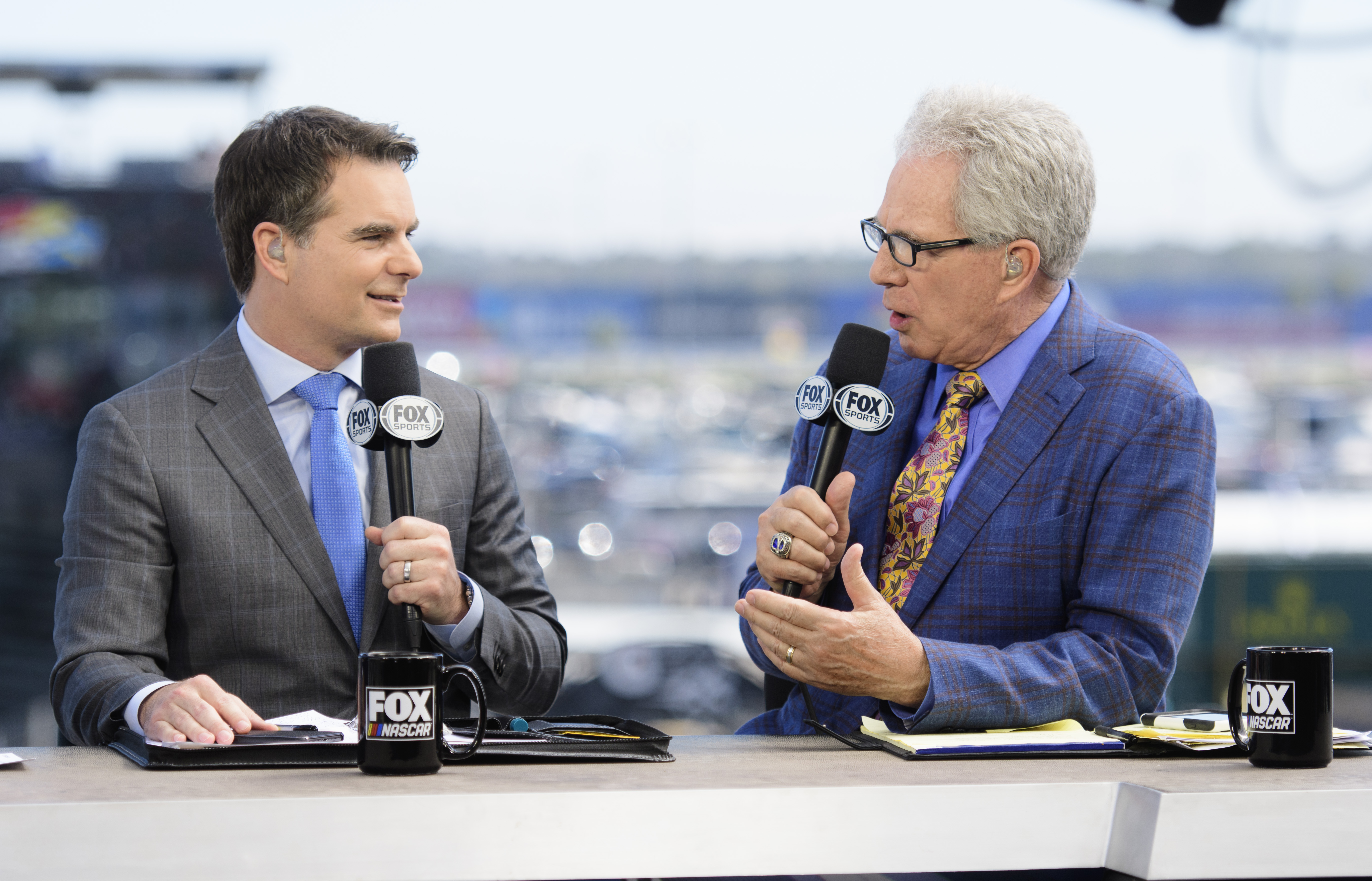
When it comes to next steps for you, is there something in mind that you feel as though you have the itch to do?
Well, I mean I definitely see so many great story lines in this garage area, I wouldn’t mind being a part of a project that showcased the personality and some of the story lines that was not necessarily a part of the racing broadcast. I think that could be fun. And then of course probably be more involved in that on the competition side.
With the fans, how do you honor those fans but still bring in the new ones?
I just think you have to show them that they matter. I think there’s a period of time where they probably didn’t feel that way because ticket prices were going up, parking prices were going up, gas prices were going up, and hotels. It wasn’t just things NASCAR could control, and it seemed like advertising and different things were very geared towards getting technology to young kids.
I think Steve Phelps as president right now, he’s doing a phenomenal job, and he’s actually was recently in an interview saying that they recognize that. And I think that’s the first time I’ve heard somebody at that level within NASCAR kinda call themselves out and say, we get it, and we’re gonna change how we go about that in the future. So I think the fans will relate to that.
Do you think that there’s been a concerted effort among the drivers to embrace media opportunities more and kind of work more with broadcasting?
Oh yeah, they don’t have a choice. Because the teams are coming to them saying listen, our sponsors are asking for more so we’re gonna ask for more, TV broadcast is asking for more. I think right now there’s a big push of more. We gotta do more whether it be promoting the race that’s coming up on the west coast, the Daytona 500, the season. I just see them engaging more people, whether it be on social media or TV or whatever it may be, to do more and so far from what I’ve seen, it’s working.
How do you balance that though if at the end of the day, you’re still trying to win a race?
And that’s where it gets tricky, because ultimately that is what it is all about. Your performance is always gonna be the thing that you gravitate towards the most. But that’s where you gotta have the right team. It’s no different than Bubba Wallace, right? I mean, he can put all the effort in the world in that he wants right now to the races he’s in and the results are not gonna be there. Where on on the other hand if Joey Logano can be there and say I need to rely on my team a little bit more to give me the cars and the team, so there’s a balance to it. It’s funny, the greatest years I ever had, the better my cars and my team were, the better I could actually be away from the track.
Yeah, you could trust them.
You could trust in them. And you knew when you got to the racetrack, you had the team and the cars, and they could trust that they had the right guy behind the wheel. You just have to know how to shut those things off. There’s a period of time where it’s okay, disengage with the promotional side of it, and fully engage in the race car.
You mentioned F1 previously, and they put everything they have into the performance of these cars, but access was going way down for awhile there. They’ve got those marketing guys in charge now, but there’s still some push and pull on the efforts of those teams.
Well I think yeah it’s pretty interesting to me to see a guy like Lewis Hamilton rise to the top of the score, and you’re seeing him do more to promote the sport than ever. And that tells me that they’ve recognized that they were getting away from accessibility and that what they were up against, and maybe some of it is in competing in the U.S.
Yeah, he sees it.
And understanding what they’re up against, and he came to the NASCAR race, right? In 2015. I think it’s probably a bit of an eye opener for him to say, “Oh my gosh, look at this, we don’t engage in our fans at this level.” I see them making more of an effort.
And he’s a person too and he didn’t get recognized as much as he probably thought he was going to…
Yeah right? The greatest problem you can have is you can’t go anywhere in the world without somebody knowing who you are, and whether it be me going over to Europe or Lewis coming to the U.S., not as easily recognizable. And that’s a great thing, but at the same time, you’re kind of wishing that you made a bigger mark.






